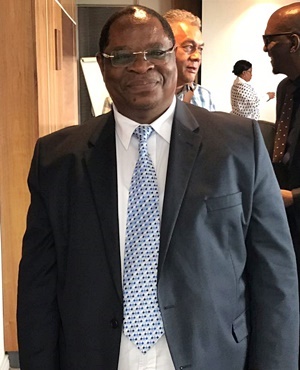
Day one of the judicial commission into state capture has made some things palpably clear: this is going to be a long and hard slog, the "defence" lawyers won’t hesitate to hurl a spanner in the works and Deputy Chief Justice Ray Zondo will be the biggest determinant of the body’s success.
There is no doubt that the start of the commission was a poignant moment in our country’s democratic history. We have become so used to news of grand corruption, patronage and state capture that South Africans are almost numb to the possibility of justice and accountability. This is of course not only understandable, but justified. We have yet to see anyone in government or the state being held accountable for misdeeds related to the Guptas and former president Jacob Zuma.
But this commission could be different to some of its recent forerunners, the Marikana and arms deal commissions. For one, the chairperson isn’t a retired judge but a sitting judge on the bench of the Consitutional Court, the deputy chief justice no less, appointed by the chief justice himself. The inquiry will function under the protection of Chief Justice Mogoeng Mogoeng. The commission’s support staff is also not to be trifled: head of legal, advocate Paul Pretorius, was thorough and clear in his opening address, while head of investigations Terence Nombembe, a former auditor general, leads a crack team of investigators.
Pretorius and his colleagues went to great lengths to locate the commission squarely within the country’s constitutional framework. In his opening address Pretorius explained that the commission’s powers and responsibilities are not only derived from the terms of reference, but also from the Constitution and related laws. The Constitution, and statutes like the Executive Members’ Ethics Act, places a responsibility on public representatives – especially the president and his ministers – to manage public resources with great care.
The 1996 Constitution, Pretorius explained, requires that public resources be used to address historical imbalances and enable transformation and development. If these resources are diverted for irregular and private ends, society needs to find a way to expose and stop it.
There is no doubt the inquiry will face headwinds in the coming months. It will be attacked from within the ANC as an attempt to settle political scores, or from radicals and reactionaries as a tool to purge government from proponents of radical economic transformation or as a vehicle to safeguard the interests of white monopoly capital. Pretorius had tried to pre-empt this by explaining the socio-economic urgency of not only exposing the rot of state capture, but to illustrate the devastating impact on society at large and how the provision of services has been affected.
Individuals who have been implicated, like Zuma, the Guptas, Lynne Brown and others, have all appointed high-powered lawyers and senior counsel to defend them. Mike Hellens (for Ajay Gupta), Jaap Cilliers (for arms deal figure and Gupta fixer, Fana Hlongwane) and Muzi Sikhakane (for Zuma) aren’t there for the show. They will do whatever they can to protect their clients’ interests. Already on day one there were grumblings that some of these legal teams did not have enough time to prepare or received notices too late. "We don’t want to delay the commission’s work," one said, which means only one thing: they want to delay the commission’s work.
The inquiry and its process and procedure will have to be beyond reproach, far beyond the standard cleaner than Caesar’s wife parable. It cannot afford slipping up with notices to testify, the provision of documents and reports or any other technicality which can be used to undermine the integrity of the commission.
And that’s where Zondo comes in. Not only must he ensure that he runs a tight ship – with the aid of Pretorius and Nombembe – but he needs to move things along. A commission of inquiry can very easily start to drift, with meaningless testimony and witnesses put forward to frustrate and obfuscate. Zondo must take charge of the process so that it hums at a reasonable pace and rhythm.
Also read: Who is Judge Raymond Zondo?
The commission has been given two years to report to President Cyril Ramaphosa. But it must complete its work in a fraction of that time in order to keep public interest and the pressure on the capture network. Zondo must ensure the commission has a sharp edge to it, he must insist that his evidence leaders are clear and concise in their planning and execution and that they aren’t lulled into becoming actors in a sideshow.
The odds are already lengthening on getting clarity into incidents like Mcebisi Jonas and Ajay Gupta at Saxonwold, Zuma and Vytjie Mentor’s meeting at the same mansion and the edict issued to former government communications head Themba Maseko to help The New Age with advertising.
On Monday morning there was a sense of expectation inside the cavernous hall in Parktown where the inquiry is conducting its affairs. It was heartening to see a witness box, good organisation and rows and rows of seating for the commission’s secretariat and support staff and the armies of lawyers.
"South Africa is exceptional in the way it reacted to the phenomenon of state capture… the judiciary, Chapter Nine institutions and civil society," said Pretorius. This commission must take Pretorius’ stated exceptionalism to its logical conclusion and help put individuals behind bars.
- Pieter du Toit is News24's assistant editor for in-depth news.
Disclaimer: News24 encourages freedom of speech and the expression of diverse views. The views of columnists published on News24 are therefore their own and do not necessarily represent the views of News24.




 Publications
Publications
 Partners
Partners























